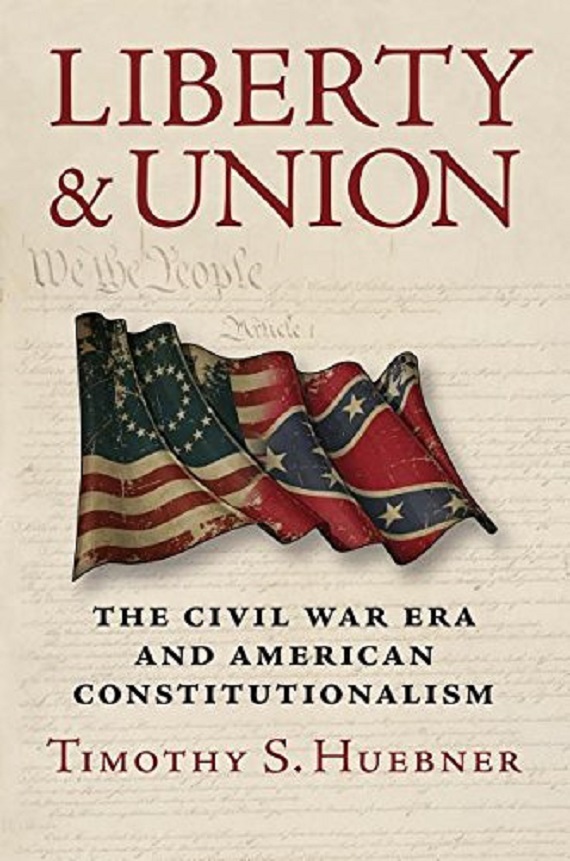A review of Liberty & Union: The Civil War Era and American Constitutionalism by Timothy S. Huebner (Lawrence: University Press of Kansas, 2016).
Timothy S. Huebner’s new synthetic account of the Civil War and Reconstruction melds military history, political history, constitutional history, and black history in telling the tale of the most popular subject in American history. Published by one of the leading academic presses, it likely will serve as the go-to account for a generation.
What distinguishes this synthesis from previous summaries of the state of the field is the incorporation of the notion of black agency into the account from top to bottom. So, for example, runaways become “self-emancipated,” slaves are “enslaved people,” and the tendentious approach to the US Constitution culminating in Frederick Douglass’s urging on of the Union cause is an alternative “constitutionalism.”
Once upon a time, historians of the Civil War considered it a tragic event leading to essentially no good results. Now, one might update that reading by recounting the great—and, pace a previous generation’s account, highly desirable—improvement of blacks’ situation resulting from the war, which was the war’s most important result, while on the other hand detailing the new consensus that even more soldiers died in the war than we once thought and giving attention to the terrible constitutional precedents arising from the Union presidents’ conduct during the war and the federal courts’ jurisprudential gymnastics in support of that conduct. Unfortunately, such a tragic account of the war is not fashionable.
Take for example Prof. Huebner’s version of the Supreme Court’s decision of the Prize Cases (1863). President Abraham Lincoln imposed a blockade on the seceded southern states early in the war, and this raised considerable difficulty for him. Under the law of nations (the 19th-century analogue of today’s international law), a blockade could only be imposed upon a sovereign nation. For his own domestic purposes, however, Lincoln did not want to concede that the Confederate States were a sovereign nation. The Court held that for international purposes, the Confederate States were sovereign, while for domestic purposes, they were not.
Here we have part of the constitutional scaffolding of today’s perpetual-warfare Executive Branch. Rather than note the absurdity of the Court’s fish and fowl decision, let alone the dangerous ramifications with which it was packed, Huebner merely says it was a great victory for the Lincoln Administration. He then segues into an account of Union conscription, which he says “appeared to pose the greatest direct threat to individual liberty.” The most vociferous critic of these developments, Ohioan Clement Vellandigham, is classified as a “symbol for self-proclaimed liberty-loving Democrats,” and Huebner refers to him using the partisan term “Copperhead.”
This pro-government strain runs through the entire book. So, for example, Lincoln’s famous Gettysburg Address “succinctly captured Lincoln’s beliefs, his shifting emphasis from the Constitution and ‘the Union’ to the Declaration of Independence and ‘the nation.’” Like his account of the legal issues described above, this is a perfectly biased account. Lincoln’s “Declaration of Independence,” which Huebner occasionally refers to as “Jefferson’s,” had essentially no similarity to Jefferson’s. The argument of Jefferson’s immortal justification of American separation from Britain was that the natural political equality of all men entitled them to replace government when they found the need to do so, and they were doing so in 1776. It declared the existence not of an American “nation,” but of thirteen “free and independent states” (that is, sovereignties). This is the very opposite of Lincoln’s characterization of Jefferson’s argument. Huebner merely recounts Lincoln’s statements without providing any analysis at all.
Huebner avers in concluding the pivotal chapter “Politics and Constitutionalism in the Wartime Union” that President Lincoln’s “unwavering commitment to his presidential oath gave him a clear-eyed determination to suppress the rebellion and, in order to do so, the president was willing to suspend the writ of habeas corpus, push bold financial legislation, and implement a controversial military draft.” Here again he takes for granted what was at issue: this time, that secession was constitutionally impermissible and that the presidential oath bound Lincoln to make war to undo it. In light of the strong evidence that much northern opinion disagreed with him about the first issue, from the ratification of the Constitution to the war’s end, this simply will not do. Besides that, one struggles to make supposed commitment to the oath consistent with the various unconstitutional steps Lincoln took in suppressing secession.
As a former student of the great historian of nineteenth-century politics Michael Holt, I cannot resist one further observation: Holt’s reading of these events is virtually absent from Huebner’s book. One has not the slightest indication that perhaps electoral motives affected President-Elect Lincoln’s behavior during the secession winter of 1860-61. Maybe his reading of the oath of office affected his calculations, let us assume arguendo, but how about the prospect of running for reelection on a platform of “You voted Republican in 1860, and the Union split in two. Four more years!” Only a very rare bird would relish that prospect. Only a prodigy of a politician would be unaffected by it.
The best part of this tome is its account of black men’s role in the war and the improvement in former slaves’ lives wrought by abolition. Segregation was unjust, certainly, but contemporary claims that the Civil War was followed by a century of reenslavement are false. Former slaves were treated unjustly, but they were free to make families, organize their own labor, marry, name their children, and otherwise live in newfound dignity. At last.







